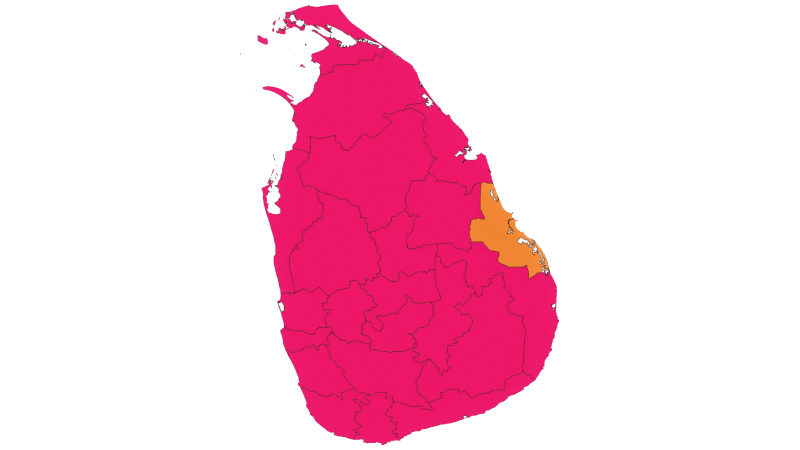 It has become almost cliché-like to say that Tamil politics has undergone a sea change, as indicative from last week’s election results. What has happened?
It has become almost cliché-like to say that Tamil politics has undergone a sea change, as indicative from last week’s election results. What has happened?
Tamil voters in the Eastern province, the hill country, and the North seem to have inverted the usual playbook. Wherever they haven’t quite done that, they have disrupted the status quo to such an extent that regulation Tamil politics has been stood on its head.
Tamil politicians such as M. A. Sumanthiran must be scratching their heads wondering what hit them. A Sinhala political party with a revolutionary past that barely had a rudimentary presence in the Jaffna peninsula a couple of years back, won the most number of seats in the Jaffna district.
Jaffna and the Northern province was done with the status quo, as much as the rest of the country was. By and large, it was due to the same reason people got tired of the mainstream political parties such as the UNP, SLFP and their successor coalitions in the Sinhala-dominated areas of the country.
Tamil voters felt their politicians couldn’t move the needle. They couldn’t move the needle with regard to the local economy, which remained stagnant, or with regard to winning minority or regional rights.
Finally, the minority-voter had come into his own after the end of the war in 2009. The Tamil voter realised he or she is not beholden to anyone in the Tamil community, either in the country or abroad in the diaspora, as they as pliant voters have a life of their own and are not the instruments of politicians who take them for granted.
ROUGHSHOD
This proves at the end of the day that guns may boom, that Tamil pride may be at stake, and Tamil voters may feel in their hearts that their war-heroes have not been properly commemorated, but that everything is secondary to choosing their own representatives to advance any of their causes.
In any event, politicians such as M. A. Sumanthiran were blowing hot and cold about the legacy of the war and the debt Tamils think is owed to fallen warriors of war. That gave the cue to Tamil voters to decide that no leader is serious about all the lofty talks about Tamil rights.
Tamil voters see right through that type of chicanery, whether they are from the North, the East or the plantations. They saw in the NPP a Sinhala political party they could vote for.
This new agglomeration of forces bucked the trend and didn’t carry any of the baggage of the UNP, SLFP or their successor parties with regard to the treatment of Tamils during the long-running war in the country. That was for the simple reason that the JVP, the main constituent party of the NPP, was never in power to play any role in riding roughshod over Tamil rights.
Of course, it would be said that the JVP had a so-called Sinhala nationalist history. There was a time the JVP was known to be radically nationalist, but that was in the distant past. The party had morphed in recent times in particular, into one that is rather liberal in outlook, and multi-ethnic in character. The Muslim support for the NPP, for instance, in this year’s elections in the predominantly Sinhala areas of the country, was off the charts.
But it’s not the NPP’s politics that is the subject of this article. It is the abrupt spurning of traditional Tamil politics in the peninsula that is interesting.
The last time a Sinhala politician won the Tamil vote, rather spectacularly in the North was in the 90s when Chandrika Bandaranaike Kumaratunga was elected President. But this was in the hope that she could be the harbinger of peace, when war was in full spate. That was a different set of circumstances.
The Sumanthirans, the Pilleyans and the Devanandas — meaning all leaders of that ilk from various parties, have been essentially wiped out at this election. Not just that, the hill-country domination by the plantation unions which was almost set in stone, has come undone because of the leadership it is said, of a single lady, Ambika Samuel, who was born and raised in the tea plucker’s line rooms.
This then was a prime example of longstanding allegiances coming undone because the common man had his comeuppance. There was a tsunami of discontent against all types of manifestations of the status quo.
That was obvious, but what was manifestly remarkable was ethnically motivated voters hitherto voting almost always on ethnic lines — or union centred voters — spurning those age old ties, because the worm had turned.
People who have felt ignored would always turn to a saviour and this was the political season in which they did it. They couldn’t quite stand the remoteness of Colombo-based politicians dictating terms to them in Jaffna. They couldn’t stomach union leaders lording over them, when these fire-breathing hotheads themselves had never lived in a line room that reeks of poverty.
But the beauty of it in a way was that the effective demolition of traditional political parties in the Sinhala majority areas of the country synchronised with the effective demolition of traditional Tamil political parties such as ITAK, and union based Tamil-dominated political parties in the plantation sector. Who would have thought that the slogan, “cleanse the 225 in Parliament” would have resonated with Tamil voters who, it was thought, were voting purely out of allegiance to whatever was defined as their ethnically-based cause?
This is not to say that suddenly those causes such as the issue of the dignity of Tamil people is not important to them. But it seems they don’t want politicians pandering to these causes merely to obtain their votes, and take them for granted.
That the worm has turned, is the only way to describe it, and the worm turned in all areas of the country, ethnicity notwithstanding. As for Tamil politicians who had taken votes for granted, it seems they did take advantage of the helplessness of the people. They indulged, for instance, in their own turf wars, sometimes being unable to effectively resolve leadership issues within the party.
CATEGORIES
But the voters were mere ringside spectators to all of this most of the time, and never felt as if they or their causes were represented. When incumbent President Anura Kumara Dissanayake said on the campaign trail that the people of the Northern province should not feel left out of the feeling of empowerment that fellow citizens of the country were experiencing after the uprising of 2022 when the then President was ousted, he was accused of being a racist by former President Ranil Wickremesinghe.
It seems that at least in the 2024 parliamentary election that was concluded just a week ago, the voters of the North and elsewhere in Tamil majority areas of the country took Mr. Dissanayake seriously and paid heed. They seemed to rebel against their anointed leadership that had appointed themselves guardians of the fate of the Tamil population in majority Tamil regions.
rejected
One reason may be that ethnically motivated politics had been rejected on cue in both Sinhala and Tamil areas of the country. Muslim voters too seem to follow suit, except perhaps in one tiny Eastern enclave.
This augurs well for the country 15 years after the war ended. What’s incontrovertible is that ethnic/race-baiting politics has been rejected on both sides of what used to be the ethnic divide. The Sinhalese voted essentially to reject race-based categories, and the Tamils in their areas did likewise.
Perhaps, both Tamils and Sinhalese felt hard done by, with politicians whipping up issues of land and other matters that divided the community, rather than uniting people. Mostly, they were appalled that these issues were kept in the front-burner to cast the spotlight away from their hardships such as economic difficulties. Small wonder the worm turned.







